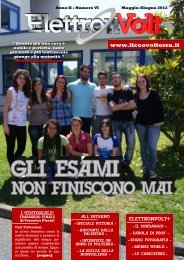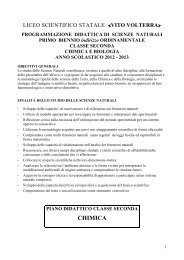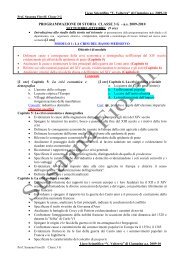Tesina - Liceo Scientifico Statale Vito Volterra
Tesina - Liceo Scientifico Statale Vito Volterra
Tesina - Liceo Scientifico Statale Vito Volterra
You also want an ePaper? Increase the reach of your titles
YUMPU automatically turns print PDFs into web optimized ePapers that Google loves.
The ruddy limbs & flaming hair,<br />
But Desire Gratified<br />
Plants fruits & beauty there.<br />
He did not hold with the doctrine of God as a Lord, an entity separate from and superior to<br />
mankind. This is very much in line with his belief in liberty and equality in society and between the<br />
sexes.<br />
Assessment<br />
Creative mindset<br />
Northrop Frye, commenting on Blake's consistency in strongly held views, notes that Blake<br />
"himself says that his notes on [Joshua] Reynolds, written at fifty, are 'exactly Similar' to those on<br />
Locke and Bacon, written when he was 'very Young'. Even phrases and lines of verse will reappear<br />
as much as forty years later. Consistency in maintaining what he believed to be true was itself one<br />
of his leading principles ... Consistency, then, foolish or otherwise, is one of Blake's chief<br />
preoccupations, just as 'self-contradiction' is always one of his most contemptuous comments".<br />
Blake's Visions<br />
From a young age, William Blake claimed to have seen visions. The earliest instance occurred at<br />
the age of about eight or ten in Peckham Rye, London, when he reported seeing a tree filled with<br />
angels "bespangling every bough like stars." According to Blake's Victorian biographer Gilchrist,<br />
he returned home to report his vision, but only escaped being thrashed by his father through the<br />
intervention of his mother. Though all the evidence suggests that his parents were largely<br />
supportive, his mother seems to have been especially so, and several of Blake's early drawings and<br />
poems decorated the walls of her chamber.<br />
On another occasion, Blake watched haymakers at work, and thought he saw angelic figures<br />
walking among them. In later life, his wife Catherine would recall the time he saw God's head "put<br />
to the window". The vision, Catherine reminded her husband, "Set you ascreaming." [25]<br />
Blake claimed to experience visions throughout his life. They were often associated with<br />
beautiful religious themes and imagery, and therefore may have inspired him further with spiritual<br />
works and pursuits. Certainly, religious concepts and imagery figure centrally in Blake's works.<br />
God and Christianity constituted the intellectual center of his writings, from which he drew<br />
inspiration. In addition, Blake believed that he was personally instructed and encouraged by<br />
Archangels to create his artistic works, which he claimed were actively read and enjoyed by those<br />
same Archangels.<br />
In a letter to William Hayley, dated May 6, 1800, Blake writes:<br />
"I know that our deceased friends are more really with us than when they were apparent to our<br />
mortal part. Thirteen years ago I lost a brother, and with his spirit I converse daily and hourly in the<br />
spirit, and see him in my remembrance, in the region of my imagination. I hear his advice, and even<br />
now write from his dictate."<br />
In a letter to John Flaxman, dated September 21, 1800, Blake writes:<br />
"[The town of] Felpham is a sweet place for Study, because it is more spiritual than London.<br />
Heaven opens here on all sides her golden Gates; her windows are not obstructed by vapours;<br />
voices of Celestial inhabitants are more distinctly heard, & their forms more distinctly seen; & my<br />
Cottage is also a Shadow of their houses. My Wife & Sister are both well, courting Neptune for an<br />
embrace... I am more famed in Heaven for my works than I could well conceive. In my Brain are<br />
44


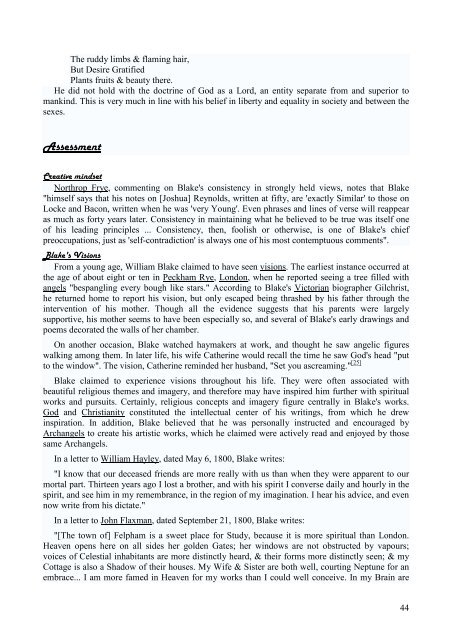
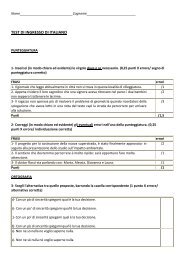
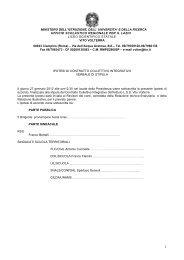
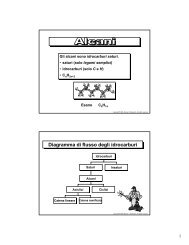
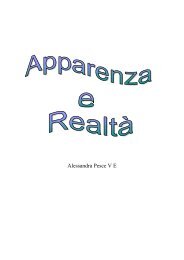
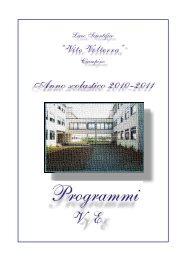
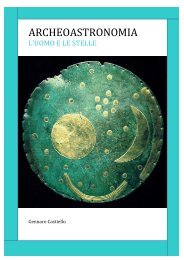

![SETTEMBRE – NOVEMBRE [20 ore] - Liceo Scientifico Statale Vito ...](https://img.yumpu.com/16098766/1/184x260/settembre-novembre-20-ore-liceo-scientifico-statale-vito-.jpg?quality=85)

